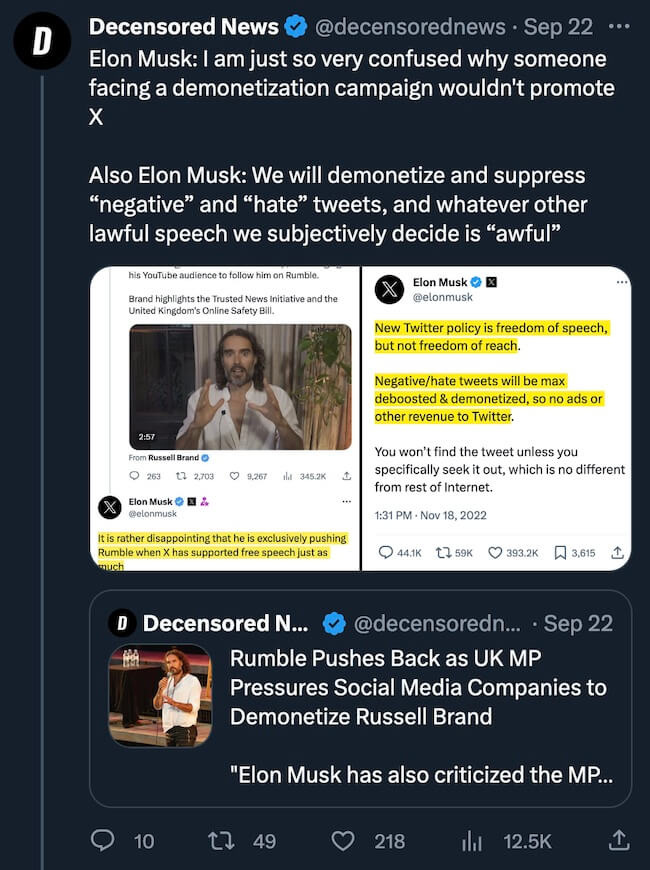YouTube Demonetizes Journalists’ Entire Livestream for Simply Playing a Clip of Russell Brand
Governments and Big Tech seem to be trying to use Brand to set numerous precedents, including this type of “unpersoning”
The Grayzone‘s Max Blumenthal says YouTube demonetized his indie media outlet’s entire 94-minute livestream yesterday because they played a clip of Russell Brand discussing his own demonetization.
The relevant part of the stream can be seen here (should jump to 55:40):
Blumenthal, along with co-host Aaron Maté, watched the three-min clip for the first time live on air as part of a 25+ minute segment about “the Russell Brand affair,” and online censorship more broadly.
“Eight minutes ago, Russell Brand dropped this,” Blumenthal said at the top of the segment, referencing the clip.
“So, I’m just gonna put it up there, and we’re gonna discuss the Russell Brand affair in light of new developments in the EU and UK… new laws to censor speech, to effectively ban encrypted applications, and to control the minds of European citizens.”
The primary law that Blumenthal was alluding to – which he and Maté go on to cover during the livestream – is called the Online Safety Bill, or OSB.
Contrary its Orwellian name, the OSB, which was passed earlier this week by the UK Parliament, will actually “lead to a much more censored, locked-down internet for British users,” according to an article by the Electronic Frontier Foundation (EFF).
“The bill could empower the government to undermine not just the privacy and security of U.K. residents, but internet users worldwide,” the EFF continued, before going on to detail how it would force companies to build a backdoor into their own encryption technologies.
After giving another minute or so of context, Blumenthal continued his preface of the clip by saying in part: “I haven’t watched anything [Russell Brand has] said yet. This just went up. So, let’s hear what he has to say in response to this scandal.”
For that, they were demonetized.
“This represents a new level of censorship, aiming to eradicate [Brand’s] presence from people’s minds,” said writer Sulaiman Ahmed on X in reference to The Grayzone‘s demonetization. “How far will they go in their attempts to censor?”
“YouTube [is] keeping Brand (and us) on the platform while demonetizing us so it can take all the ad revenue we the creators earned,” commented Blumenthal, who is The Grayzone‘s editor.
Numerous users urged Blumenthal to leave the platform for Rumble, to which he replied: “Not planning to completely migrate over there yet, but we will add it into the mix. We’re also on Rokfin.”
“I specifically didn’t play the clip [because] I just knew they were going to take my stream down in real time,” said Niko House, a popular political commentator and YouTuber.
“This is ridiculous smh [shaking my head]… not a single violation of YouTube guidelines. Just a reminder that there are some voices you can promote and certain voices you can’t.”
House’s comments touch on an important subject that Decensored News wrote about recently: self-censorship:
We – people who care about freedom of speech, and freedom in general – talk a lot about censorship, but we probably don’t talk enough about self-censorship. (…)
How many people modified their language or bit their tongue during “Twitter 1.0” to avoid getting banned or shadow-banned?
(The common thought process was, “at least I can get some truth out; if I get banned then I’m silenced completely.”)
How many people on “Twitter 2.0” are doing the same thing now, knowing that certain things will (still) get you “deboosted,” shadow-banned… or outright banned?
The answer to those questions is “a lot,” and it obviously applies to other platforms besides X (formerly Twitter) – perhaps even more so when it comes to YouTube, which is even more overtly pro-censorship than X, where Musk at least tries to posture as somehow being a champion of “free speech.”
This dynamic of Big Tech wielding various sticks and carrots to coerce independent media (and their followers) to self-censor will persist until said writers, pundits, and “influencers” migrate more decisively away from these platforms, taking their audiences with them.
The “bigger names” are best-equipped and positioned to lead such a mass exodus, but so far most of them seem unwilling to do so, partially because of the “guilded cage” within which many of them reside (and in some cases, openly celebrate).
This article was originally published on the Decensored News website.






